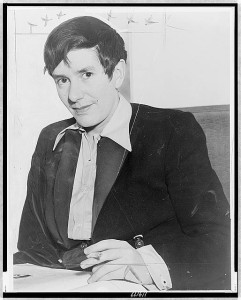Erika Mann, the flamboyant, fascinating daughter of Nobel prize winner, Thomas Mann, piqued my interest a few months ago when I saw the 1932 film, Mädchen in Uniform. Erika plays a supporting role as one of the teachers in the film, and seeing her onscreen sent me in a spiral of research, reading works by and about both of the eldest Mann children, Erika and her close brother, Klaus.
From Berlin’s cabarets in the 1920s to a life of exile in the 1930s that made her stateless until her lavender marriage to English poet, W.H. Auden, got her a passport, Erika zoomed about trying to find joy while taking issue with the political climate.
I have no desire to be political myself, but as it becomes more likely that someone many of us once thought was a joke is now a viable candidate for president, with comparisons to even contemporary leaders that make one shudder, we must look to history for proof of what can happen when radical leaders take power. Because it’s all there.
Erika Mann’s essay, “Don’t Make the Same Mistakes,” appears in the 1940 collection Zero Hour: A Summons to the Free. This appeal, to a young American she meets on a train on the way to Los Angeles, is meant as advice to a country on the sidelines of a Europe under siege, but her words are just as applicable today:
But what constitutes the disease? Fascism, Nazism, dictatorship, defeat? No! Because they already are death. The “disease”—that is the inability of the body to resist Death. The decay of the organism, the breakdown of resistance, that is the disease.
She goes on to write a full essay-within-the-essay for her young companion, outlining the symptoms of decay, her own experience as a non-political actress silenced by a horde of Brownshirts in 1931, a political meeting with a group of friends in Berlin, and ultimately the failure of resistance. Perhaps most haunting of all are her words closer to the beginning of the essay, when she passionately tries to explain why this history matters:
“You will not believe,” I added, and noticed that my tone was a little too intense, “you can’t imagine how painful it is gradually to discover that no country, no nation, no youth has wanted to draw a lesson from our dreadful example.”
Please, draw a lesson. History like this—a dreadful example like this—should not be allowed to repeat itself.
